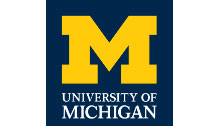This job has Expired

Data Science Postdoc-CIGLR
Job Description
How to Apply
To be considered for this position, applicants should submit a one-page cover letter indicating planned research focus for the postdoctoral fellowship, and how it aligns with applicantís career trajectory, CV, two representative publications, and contact information for two references. Incorporating these materials as a single PDF file is preferred, but additional files may be emailed to Ayumi Fujisaki-Manome, ayumif@umich.edu. Application review will begin the week of December 5, 2022, and will continue until the position is filled. The position is expected to start in early 2023.
Summary
The Cooperative Institute for Great Lakes Research (CIGLR) is seeking outstanding candidates for a postdoctoral scholar position in data science. In collaboration with the National Oceanic and Atmospheric Administration (NOAA) Great Lakes Environmental Research Laboratory (GLERL) and School for Environment and Sustainability (SEAS), the successful candidate will lead research that utilizes data science to advance hydrometeorological prediction and water management decision support. The postdoctoral fellow will be part of a large interdisciplinary team at GLERL, CIGLR, and SEAS that is developing the next generation prediction system for determining the mean and extreme water levels. This new system will provide the foundation for defining the risk of coastal inundation impacts across subseasonal to annual time scales for the Laurentian Great Lakes.†
Specifically, the postdoctoral fellow will utilize data-driven approaches to optimize the design of a next generation water level prediction system for subseasonal to annual predictions. Approaches will leverage the latest advancements in hydrometeorological data; modeling of meteorology, climate, and hydrology; and forecasting to characterize hydrometeorological variability across space-time scales, identify sources of uncertainty, and improve predictability of water supply and water levels. Work will be conducted as part of an interdisciplinary team bringing together expertise in meteorology and climate, hydrology, water management, and stakeholder engagement.††
This person will spend their on-site work time at the NOAA Great Lakes Environmental Research Laboratory in Ann Arbor, Michigan. Hybrid and flexible work agreements may be made to allow for partial off-site work.††
Term Appointment:This is a one (1) year term limited position with the possibility for extension contingent on performance and availability of funding.†
Mission Statement
The successful applicantís appointment will be with CIGLR, which is part of the University of Michiganís School for Environment and Sustainability located in Ann Arbor, Michigan. CIGLRís mission is to lead research, develop applications and products, and engage with stakeholders to achieve environmental, economic, and social sustainability in the Great Lakes. CIGLR is a collaboration between the University of Michigan and NOAA that brings together experts from academia and government research labs to work on pressing problems facing the Great Lakes region.†
SEAS is committed to creating and maintaining an inclusive and equitable environment that respects diverse experiences, promotes generous listening and communications, and discourages and restoratively respond to acts of discrimination, harassment, or injustice. Our commitment to diversity, equity and inclusion is deeply rooted in our values for a sustainable and just society.
Why Work at Michigan?
In addition to a career filled with purpose and opportunity, The University of Michigan offers a comprehensive benefits package to help you stay well, protect yourself and your family and plan for a secure future. Benefits include:
Generous time off
A retirement plan that provides two-for-one matching contributions with immediate vesting
Many choices for comprehensive health insurance
Life insurance
Long-term disability coverage
Flexible spending accounts for healthcare and dependent care expenses
Responsibilities*
Develop optimized methodology to blend hydroclimate datasets as inputs to the next generation water level prediction system.
Investigate source of uncertainties and predictability of net basin supply components using data-driven approaches.
Lead at least one manuscript based on research findings for submission to a peer-reviewed journal, present results at a conference(s).††
Contribute to the co-development of a next generation water supply and water level forecast for the Great Lakes through participation in stakeholder engagement activities and close collaboration with the project team.
Attend regular project meetings at GLERL, CIGLR and SEAS, as well as inter-agency group meetings to report progress.†
Required Qualifications*
PhD in hydroinformatics, statistics, mathematics, water resources engineering, or similar field.†
Demonstrated ability to conduct data-driven hydroclimate research using gridded atmospheric, land-surface, and/or hydrological model outputs for subseasonal, seasonal, and/or annual prediction time scales. Example approaches include use of stochastic methods, statistical modeling, and artificial intelligence (e.g., time series analysis, machine learning, deep learning, random forest ensemble learning, spatiotemporal data analysis). Experience with analyses to evaluate sources of uncertainty and/or predictability are particularly preferred.†
Experience working on gridded outputs from climate, atmospheric, and hydrological models, including netCDF, grib2, and HDF5 storage formats.†
Strong publication record in the relevant field, including at least one lead-author publication.
Strong communication skills and demonstrated ability to work independently in collaboration with an interdisciplinary team.
Proficiency with handling various data formats, such as NetCDF, GRIB2, ASCII, and shapefiles. This includes visualization, geospatial data analyses, and dealing with map projections using existing libraries for programming languages such as Python, R, and Matlab.†
Proficiency with working on a supercomputer or a cluster computing environment. This includes shell scripting, batch job submissions, and data transfer.††
Desired Qualifications*
Exposure to atmospheric and hydrological science, such as research that characterizes hydroclimatic variability across space-time scales.†
Understanding of global circulations, teleconnection patterns, and their impacts on regional climate (e.g., precipitation patterns).†
Experience using Great Lakes regional hydrological/climate datasets (e.g., Regional Deterministic Reanalysis System, the Canadian Precipitation Analysis system).
Additional Information
Salary will be determined based on experience.
Application Deadline
Job openings are posted for a minimum of seven calendar days. This job may be removed from posting boards and filled any time after the minimum posting period has ended.
U-M EEO/AA Statement
The University of Michigan is an equal opportunity/affirmative action employer.
U-M COVID-19 Vaccination Policy
COVID-19 vaccinations, including one booster when eligible, are required for all University of Michigan students, faculty and staff across all campuses, including Michigan Medicine.† This includes those working remotely and temporary workers. † More information on this new policy is available on the U-M Health Response website or the UM-Dearborn and UM-Flint websites.
*Please mention you saw this ad on AcademicJobs.*




